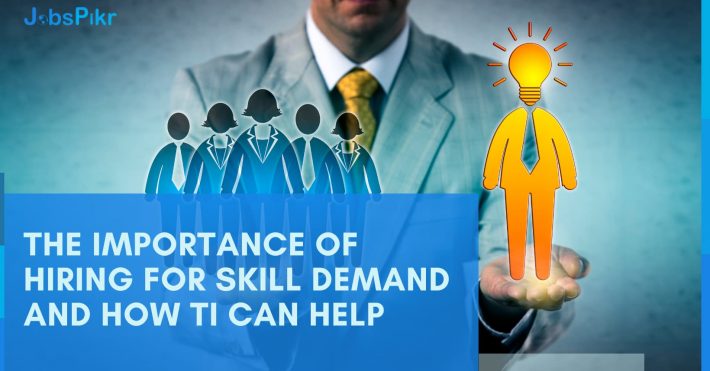Introduction
Statistically speaking, 79% of business executives acknowledge the fact that the main purpose of an organization should be to incur value for the shareholders, workers, and society as a whole. However, in today’s technologically advanced and data-driven corporate industry, many employers find it difficult to acquire the right talent. Here enters the skill-based approach that involves Strategic Workforce Planning and hiring based on skills instead of industry experience.
Now more than ever, the need for a change in the employment landscape is required. From an exponential rise in technologies to an increase in job opportunities overseas, industries need to scale up their Strategic Workforce Planning.
Scroll down to learn more about the importance of skill-based learning and how it can do wonders for a company.
The Significance of Hiring for Skill
In simple terms, the skill-first approach emphasizes the applicant’s skills and talents rather than a degree or job title. In the current job market, it has been estimated that as of 2022, more than 40% of hirers hiring via LinkedIn took a skill-based approach.
Following are a few reasons why 60% of employers who choose this approach are more likely to hire the right talent than those who do not.
- Increased Efficiency
If you focus more on the skills of a person rather than their degrees or accolade, you might be able to increase the efficiency of the organization as a whole. A skilled employee can carry out the respective task more accurately whilst saving time and money. For instance, the skills for data analysts include SQL, expertise in programming languages, and Data visualization, among others. A person equipped with these skills will be a better fit for a Data Analyst position.
- Improved Employee Retention and Diversity
It is highly necessary that you showcase a positive image for the employees by focusing on their skills. Therefore, making your employees feel appreciated and promoting a skill-based approach will attract them to your organization. Further, it will bring your company on the path of inclusion and diversity. Having hiring for-skill demands removes the arbitrary restrictions to entry and allows you access to a diverse and wide pool of talent.
- Innovation
By hiring for skill, your company might benefit from the expertise of a trained professional and assist you in maintaining a competitive edge. In today’s world, it is of paramount importance to stay in alignment with the constantly evolving technological advancements, and with the right talent, you can efficiently adapt to these changes.
With respect to the growing demand for skill-based hiring, a buzzword going around in the current job market is Talent Intelligence. The core element of building a state-of-the-art Talent strategy is directly related to the inculcation of Talent Intelligence. Before diving into the details of how this method can help organizations stay ahead of the competition, let’s start with the basics.
What is Talent Intelligence?
Talent Intelligence is a method used to analyze, collect and compile a candidate’s data in a thorough report that, in the long run, helps during the hiring process. This method uses data analytics to find the most promising candidate for the job position. From recruitment to Strategic Workforce Planning, it can be utilized to perform a wide range of talent management tasks.
Talent Intelligence: What is the buzz about?
Recruiting the right talent in today’s fast-paced world is a challenge. However, you can ace the recruitment process with the right tools, knowledge, and strategies. The Talent Intelligence method has the potential to guide industries in the right direction when it comes to hiring.
Employers need to gather and access a large number of data and insights as a part of their hiring process. This takes up a lot of manual effort and, thus, leads to certain loopholes in the recruitment journey. This is where Talent Intelligence swoops in.
Now, you might wonder why you should take up this strategy as a part of your employee hiring. Read further to find out!
- Identifying Emerging skills and talent
The Talent Intelligence tool driven by AI has the power to analyze the current market trend and anticipate the skills that will create a buzz in the future. Each company has a different talent requirement and pertaining to that, Talent Intelligence is the one-stop solution for a data-backed hiring process.
- Analyzing talent acquisition Strategic Workforce Planning
For an organization to stay ahead of the curve and maintain a winning streak, it is necessary to keep track of what its competitors are doing. In this dynamic market, with the assistance of a Talent Intelligence strategy, you can review and analyze your competitors and determine the most effective channel and technique as per the industry requirements.
- Leverage Big Data Analytics
TI can help organizations leverage big data analytics to gain insights into their talent acquisition and retention strategies. Further, by analyzing large data sets, organizations can identify patterns and trends that can inform their hiring and retention decisions and help them anticipate future talent needs.
- Monitor Talent Metrics
In addition to monitoring and benchmarking employee retention rates, hiring costs, and time-to-fill, TI can help organizations identify and understand their talent needs. These metrics can help organizations determine where to improve their talent acquisition and retention strategies by tracking them over time and comparing them to industry benchmarks.
How does a Talent Intelligent strategy support skill-based hiring?
In order to gather talent and assign them to the right position, change is inevitable. Taking a skill-based approach clubbed with a Talent intelligence strategy will provide you with a fresh perspective during the hiring process. With AI management of tools of Talent Intelligence, the recruiters have the chance to get access to organizational Strategic Workforce Planning metrics and analysis of predicted trends that facilitates building a successful Strategic Workforce Planning and global talent.
Talent intelligence can support a skill-based hiring approach by providing you with insights and data necessary to identify a candidate’s skills. By using talent intelligence to support skill-based hiring, organizations can identify and attract the best candidates with the specific skills and abilities required for a given role and make informed decisions about recruitment and talent management.
Conclusion
In a world where competition is at a peak, the right skills are imperative. By adopting a skill-based approach and leveraging talent intelligence strategies, you can hire the right people at the right time. Furthermore, you can stay ahead of the curve by taking advantage of data analysis and data-driven insights. Embrace the new technologies and approaches and lead your organization to new heights! If you wish to learn further about the two approaches as above-mentioned or any current job trends and incorporate them into your hiring process, head to the JobsPikr website.



